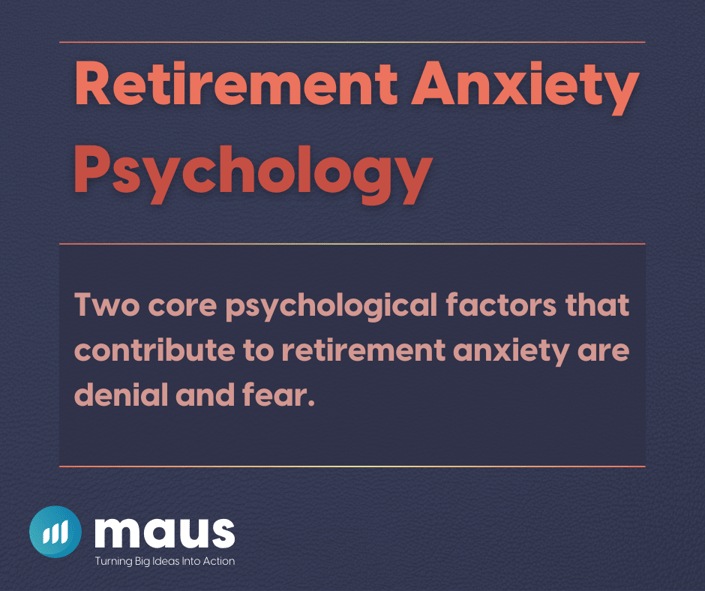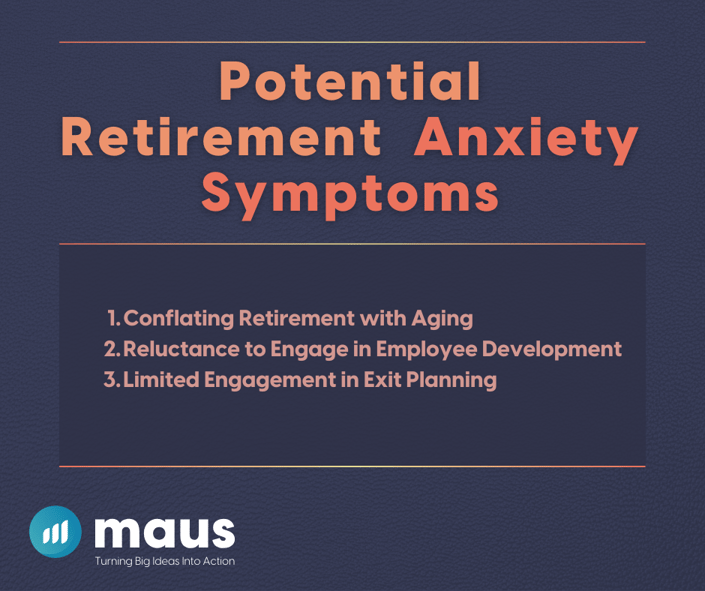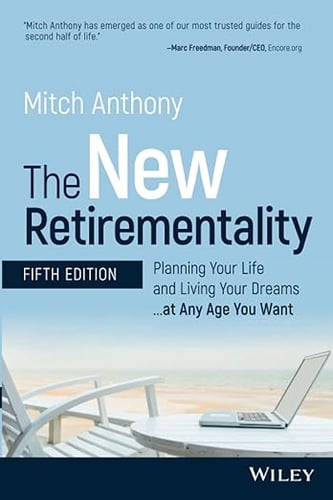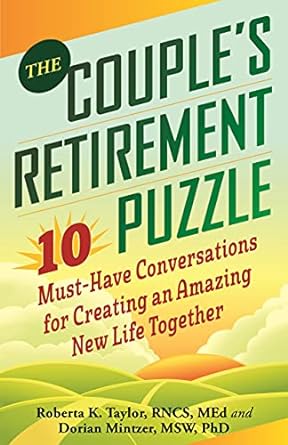RETIREMENT MAY NOT BE EASY
Over 230,000 Australians that returned to work after having retired…almost 30% of retirees are bored and 41% are financially challenged. (ABS) For...
Retirement anxiety is an emotion of concern or worry, experienced by people yet to retire, about the prospect of retirement. Examples include concerns about how they’ll fill their time, financial worries and feeling a loss of identity. The following article … Read More
Retirement anxiety is an emotion of concern or worry, experienced by people yet to retire, about the prospect of retirement. Examples include concerns about how they’ll fill their time, financial worries and feeling a loss of identity.
The following article will discuss the topic of retirement anxiety and provide valuable feedback from Larry Gard, Ph.D.
The prospect of retirement can stir up anxiety on many levels. After decades of work, it represents a huge transition, and so it’s not unusual for those contemplating retirement to report fears such as:
Whether your retirement anxiety is mild and transitory, or strong and persistent, it has the potential to disrupt planning for the transfer of your business. Planning can feel daunting because it involves so many unknowns, decisions, and choices.
Faced with numerous questions about the future, our brains will look for shortcuts.
One type of shortcut is to act impulsively instead of thinking through the consequences. We see this in people who retire with unconsidered and unrealistic ideas about how to spend their time, only to feel within a year the exact discontent they dreaded. They end up going back to the drawing board to come up with a better plan, in effect “re-retiring”.
The other shortcut is to do nothing, avoiding the matter completely.
I see two core psychological factors that contribute to retirement anxiety: Denial and fear. They tend to operate in tandem and thus are two sides of the same coin.

And denial and fear typically lead to avoidance.

Mark* is the founder and president of a disaster cleanup service. His firm employs thirty people across two locations in Northwest Indiana. One office specializes in hazardous chemical spills and the other serves residential customers who have water or smoke damage.
Mark is 62 years old, and for some time he has resisted his business advisor’s efforts to discuss planning for his retirement.
Mark has a senior manager at each location, but he dismissed the idea of promoting either one of them to president. He believes they simply don’t have what it would takes to run the company if he stepped down.
Mark is reluctant to sell the business because he is convinced that a new owner would undoubtedly consolidate the two locations, modifying operations in a way that Mark fundamentally disagrees with.
Mark also assumes that he would need to stay on for 6-12 months after the sale, and based on his father’s experience he is convinced that he couldn’t tolerate it. Decades earlier his dad sold his furniture store to a large chain, and he was in fact miserable throughout the buyout period.
Mark confided to his advisor that he was concerned he and his wife would not be able to agree on how to spend their time once he sold the business. Mark sensed that their interests and priorities had diverged over the years. He acknowledged that he was avoiding the topic as long as he could, fearing that any substantive discussion about their future would uncover seemingly irreconcilable differences.
It was a Pandora’s box he didn’t want to open.
*Client details have been altered to ensure confidentiality
Mark is operating under assumptions that may not be entirely true, and his advisor ought to challenge him. For example, just because Mark believes that his managers aren’t presidential material doesn’t make it so.
He has done nothing to test his belief, such as giving them stretch assignments to help them develop executive skills. He has not provided them with any executive education opportunities. He has not arranged for any sort of talent assessment to determine their potential to step into an executive role, nor has he provided executive coaching to help them up their game.
Mark is concerned that any moves toward retirement will stir up disagreements with his wife. The retirement transition can put a strain on some relationships, but Mark is overlooking the fact that while his fear of conflict may be real, the discord itself can most likely be managed and contained.
Similarly, Mark is assuming that a buyer will take the business in a fundamentally new direction and that he will be miserable working for the new owners. Psychologists refer to this as “fortune telling”.
Unfortunately, our confidence regarding our ability to predict the future is often much greater than our accuracy. The fact is, Mark might actually find it interesting working under such circumstances. By basing his assumption on what he witnessed with his own father, Mark has fallen victim to a cognitive error known as the availability bias.
His father’s situation is easily called to mind (more available), and therefore it carries greater weight for Mark and makes it harder for him to see that the post-sale arrangement could turn out rather positively.
“Mark, what your dad went through was truly unfortunate. We can use your father’s experience to help us plan wisely, but we shouldn’t think of it as representative of the majority of post-sale circumstances. If we’re thoughtful about how we structure things, there’s no reason for you to end up being
miserable.”
Throughout my decades as a psychologist, I saw many retired clients who were unhappy. Some had exited with ill-conceived ideas about how they would spend their time. Others were struggling to feel a sense of purpose.
And some were feeling lonely because their social network had been so heavily linked to their workplace. Knowing what a huge transition retirement can be, I was struck that these clients had not prepared themselves emotionally for their next chapter.
I was able to help most of them adjust, but it occurred to me that they might have saved considerable time, money, and emotional discomfort had they met with me for a few coaching sessions before they exited their business rather than waiting until they ran into trouble afterward.
The other reason I’m passionate about this topic is because of my father’s experience. Along with my grandfather and uncle, my dad built a business selling heavy construction equipment. The problem was, he never spoke with my brothers and me about future of his business, he didn’t create succession plan, and he refused to discuss what might happen as he got older.
Despite losing eyesight in his mid-70’s he struggled on for nearly a decade to keep the business running. Saddled with massive, unrelenting debt, he finally shut it down. It was like watching a train wreck in slow motion.
According to AARP research titled Successful Retirement Requires More Than Financial Planning, “many people don’t give any thought to planning for their physical health, emotional health, finances, or fulfillment in retirement. Emotional health receives the least planning: Over half (57%) of retired adults never gave any thought to planning for their emotional health in retirement and four in ten non-retired adults (41%) don’t know when they will start focusing on it.”
Most people focus on how much money they’ll have after they exit. Yet few of us think about what we want to gain from life afterwards and how we want it to feel. Money can give you options, but it can’t prevent you from feeling bored, aimless, or listless.
But let’s face it. The thoughts and feelings triggered as people contemplate this transition can sabotage them and derail their planning process. When business owners are ambivalent or fearful about retiring,
It’s perfectly o.k. to acknowledge your retirement worries. There have been efforts to glamorize retirement in our culture, and some have even proposed new names for it such as “Life 2.0”.
Popular media shows affluent older couples driving down the Pacific Coast Highway in a convertible or kayaking on an ocean inlet but make no mistake: this is an enormous life transition for most people.
It can be great, but there are also changes and sometimes losses associated with retirement and those are real. I’ve had clients think there’s something wrong with them because they’re not 100% thrilled with the prospect of retiring, but nothing could be further from the truth.
That said, keep in mind that feelings aren’t facts. Just because we’re concerned about negative outcomes doesn’t necessarily mean that they will come to pass.
Start by examining your beliefs and assumptions about exiting and retirement. Quite often these are derived from what we saw others go through (especially our parents and grandparents). Your background is different than theirs, so your retirement is likely to turn out differently as well.
I tell clients, “If thinking about the future stirs up fear, use that fear. It’s there for a reason. Think of it as a signal that you need to do more planning. But by all means let your advisor help you.”

We can’t ignore the fact that for most workers, retirement is concurrent with aging. Sometime our fears about aging add fuel to our fears about retiring, making the thought of exit planning even more unappealing. Planning for the future confronts us with the fact that the future is not unlimited. When we look down the road we see that it eventually ends; thus many of us prefer not to look in the first place. I tell clients, planning might not change certain outcomes in life, but it can make the journey a lot less rocky.
If you’re in your 60’s and you’re still failing to delegate, or you’re personally taking on projects that would constitute excellent “stretch” assignments for talented employees, maybe your feelings about retirement are preventing you from fostering the development of those reporting to you.
How quickly do you return calls and emails from your certified exit planning advisor? Do you procrastinate when your advisor asks you to provide information or documents? If you typically tackle business issues promptly, yet you find yourself putting exit planning on the back burner, you might want to ask yourself whether you’re feeling unsettled about the prospect of retiring.

None of us can fully predict the future, but that shouldn’t stop you from planning for it. Think back to when you purchased your first home. Chances are that eighteen months prior you had no idea which specific house you would buy. You might have had some neighborhoods in mind, the style of home you liked and so forth, but the lack of specifics didn’t stop you from planning for that major life transition. The same principle holds true with retirement planning. Just because you don’t yet know how every day will be filled doesn’t mean that you shouldn’t plan for a time when you’re not working.
Don’t reinvent the wheel. Talk to other business owners who’ve exited. Identify 3-5 people in your network and ask about their experience. Be sure to explore how the process met with or diverged from their expectations. What would they do differently if they could start over?
In my interviews with people who decided to retire, one respondent said the following: “I would encourage people not to commit to anything initially. So many people I know have settled on one activity for their retirement, thinking it’s going to be the right thing, without really examining or exploring multiple possibilities.” For example, many owners tell me they plan to play golf or do some part-time business consulting once they’ve exited. Those activities may seem compelling at first, but it’s important to be honest with yourself about whether you’ve crafted a realistic plan to fill all those hours each week.
If you’re really having trouble figuring out how you will occupy yourself, try this exercise. Make a list of all the sources of satisfaction you derive from work. Rank order them, with the greatest source of satisfaction first. For example, some people relish the social aspects of the workplace, and they enjoy helping their employees prosper. Others appreciate having a routine, fixed schedule, and they like solving each day’s challenges. The top two or three items on your list are likely to be the satisfactions you’ll miss most; try to envisage activities that could be similarly satisfying.
It’s important to get input from your family. One owner I spoke with regretted not including his wife in his deliberations. She had valuable observations about his readiness to sell, and she had some ideas about how they could spend their time that he wasn’t aware of.
Most owners only sell one business in their life but exit planning specialists do this every day. You wouldn’t build a home without a blueprint, so don’t try to sell without a solid team of advisors. Many exit planners now use specialized exit planning software designed to ensure a thorough yet efficient process.
Here are some resources I recommend to clients who are contemplating retirement:

The New Retirementality by Mitch Anthony is a thought-provoking book that challenges our ideas about retirement. He’ll open your eyes to a new way of thinking about your next chapter.

The Couples Retirement Puzzle, by Taylor and Mintzer is a terrific guide for couples, with some very practical advice for how to have productive discussions about this transition.

Retire Smart, Retire Happy – Finding Your True Path in Life, by Dr. Nancy Schlossberg, is a comprehensive yet very readable book that provides an excellent overview of the head and heart aspects of retirement.
If you’re thinking about volunteering check out the website, www.volunteermatch.org. Even if you’re not ready to commit it will give you a sense of the opportunities out there.
Larry Gard, Ph.D. is a psychologist and author of the book “Done with Work: A dozen perspectives on the decision to retire”. He provides pre-retirement coaching to late career professionals and business owners.
Disclaimer: The material in this article is for informational purposes only and is not intended to constitute professional advice. Viewing it does not establish a psychologist-client relationship since circumstances will vary from person to person.
Over 230,000 Australians that returned to work after having retired…almost 30% of retirees are bored and 41% are financially challenged. (ABS) For...
Over 230,000 Australians that returned to work after having retired…almost 30% of retirees are bored and 41% are financially challenged. (ABS) For...
Planning for retirement can feel overwhelming and even create retirement anxiety, but the 4 Percent Rule provides a more conservative approach to...
Be the first to know about new tools and knowledge from the fast-paced world of exit planning.